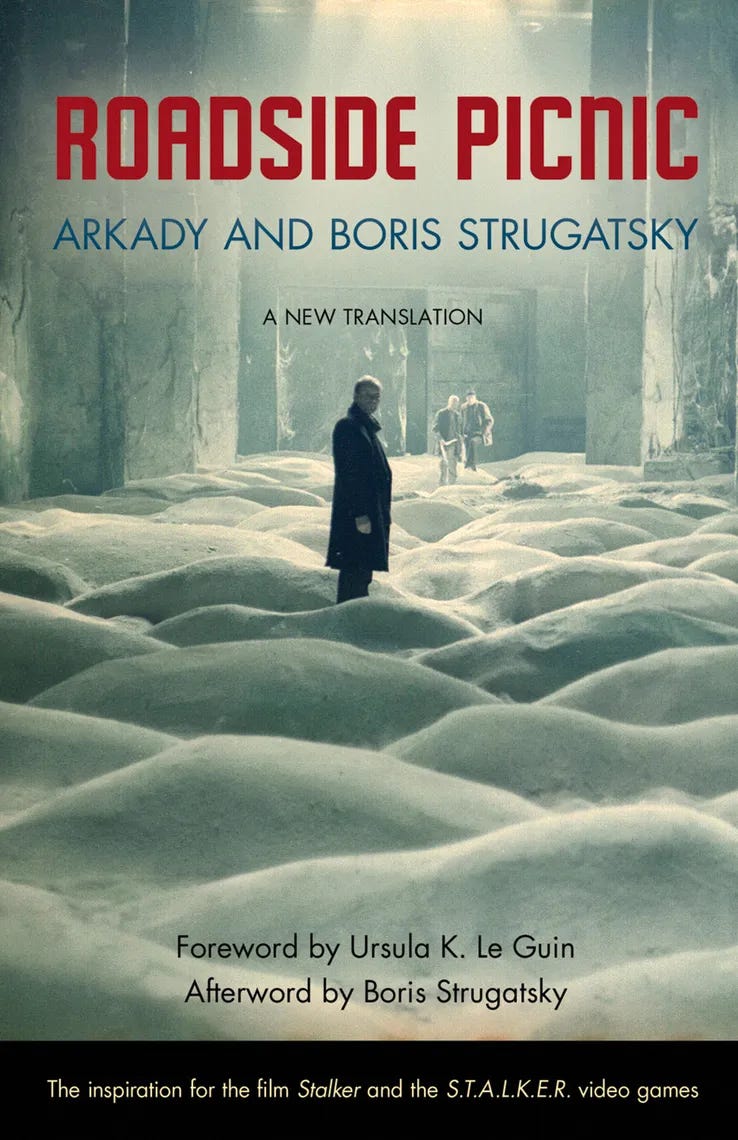Book Review: ROADSIDE PICNIC By Arkady & Boris Strugatsky
Picking up the pieces of the impossible
Book Review: ROADSIDE PICNIC By Arkady & Boris Strugatsky (1972)
In order to fully appreciate this novel, you don’t have to know the circumstances the authors were living in when they wrote it. I nevertheless think those circumstances are interesting.
The Strugatsky Brothers lived in the Soviet Union, behind the Iron Curtain, during the Cold War.
The Soviet Union in the 1970s was, much like the Russia of today, a grubby place. Even as ROADSIDE PICNIC supposedly takes place in an unspecified Western country (Canada? Northern Europe?), it definitely seems to take a great deal of inspiration from life in 1970s Russia.
The characters drink and smoke constantly. Their lives are marked by cynicism, endemic corruption, and an uncaring, callous police state. Class differences are glaringly obvious, but are never questioned in political terms (because politics is taboo). A sense of disillusion hangs over the entire setting. No one believes in anything or has real political convictions; people have no higher goals than making money by small (often shady) means, and looking after one’s family.
A spectacular alien visit in the recent past has not enlightened humanity; instead it has encouraged human weaknesses. Mysterious aliens came and went — and in the aftermath, humanity turned into scavengers.
The protagonist is a “stalker,” one of the professional scavengers who pick up the bits and pieces of alien technology that the visitors left behind. His work is extremely dangerous. The “Zone,” where he searches for artefacts, has become permanently warped by the alien visit. It’s a place where even the laws of nature cannot be trusted.
So who were the alien visitors? No one in the novel knows. They remain unseen and unexplained. The scientist characters cannot explain the aliens, or the things they left behind. It’s rare in science fiction to depict scientists as utterly useless, but ROADSIDE PICNIC does just that.
It has been said that the Strugatsky Brothers wrote non-political fiction. I’m not so sure. Science fiction writers in the Soviet Union were often quite skilled at confounding state censors. Stories set in fantastical worlds could slyly mock the system between the lines. By showing scientists as clueless and corrupt in a fictional country that resembles Russia, the authors took a dig at their supposedly “rational” Communist society.
Between the lines, ROADSIDE PICNIC deals with the themes of disillusion and dashed hopes. And I think it reflects a mood that must have been felt by citizens of the Soviet Union in the 1970s. The “stalkers” picking up the pieces of an alien visit can be a subtle metaphor — for Russians trying to make sense of how their promised utopian future had turned into a dreary, seedy dystopia.
Stanislaw Lem, the brilliant Polish-Ukrainian SF writer who also lived under the Soviet system, was not pleased with the ending of ROADSIDE PICNIC. He had a more rational, unsentimental mindset than the Strugatsky Brothers. To Lem, their novel ended too much like a fairytale…
… but does it really?
I see the novel’s ending as extremely ambivalent. The final, quite moving lines express the protagonist’s desperate yearning for a better life, for the aliens to provide a magical solution to his own and humanity’s suffering. His rage and despair, and the obvious impossibility of a magical solution, suggest a much darker outcome. (That’s what you get for living under the shadow of the Cold War — a sense of impending disaster.)
ROADSIDE PICNIC is a bleak novel. But I suggest you read it and also Lem’s SOLARIS, which deals with the same theme — humanity trying to make sense of incomprehensible aliens — and compare how these two novels arrive at different conclusions.
SOLARIS ends in mystery and frustration — but at least humanity has gone to space and there is a future. ROADSIDE PICNIC, on the other hand, ends in a volatile mix of intense despair and impossible hope. Humanity has failed to leave Earth and is just as self-destructive and shortsighted as ever.
Maybe, just maybe, the aliens can save us from ourselves? The protagonist’s hope may be in vain, but it has my sympathy.
ROADSIDE PICNIC will mystify you, and quite possibly move you. It is partly science fiction, partly magical realism. Ultimately it’s a story about people and their deepest desires.
FOOTNOTE: Tarkovsky’s famous movie adaptation STALKER (1979) differs from the book. The novel is fairly short and brisk, while Tarkovsky’s movies are slow and long-winded. Whatever you think of the movie, the novel won’t try your patience like Tarkovsky does.




Excellent review, Alf, and I too prefer the book to the film, although Tarkovsky clearly has quite different motivations and interests, as well as a much more melancholoy tone. Although oddly, he arrives at a similar conclusion, even if he's using the aliens as a religious, rather than political, metaphor. Oddly, i've not come across the opinion that the Strugatskys were apolitical - it seems pretty obvious there's a political critique implied in all their work, though, as you say, they were adept at veiling it in order to escape censors (though some of their work was never published). Perhaps this misconception of apoliticism stesm from generations unfamiliar with the books' original context? ironic in any case, given the unsetttlingly similar state of world politics today...